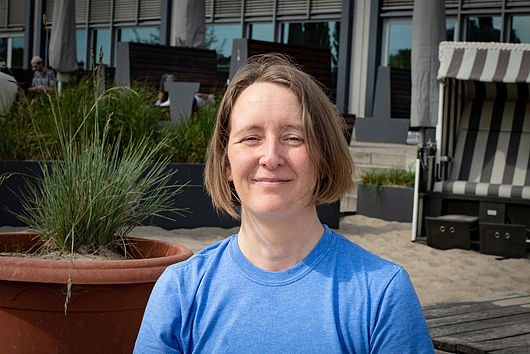Interview
Prof. Dr. Andrea Knaut
Prof. Dr. Andrea Knaut teaches a module on Data Ethics, Privacy and Governance for Pro ITD students.
Area of expertise: data ethics, informatics & society, cultural informatics, philosophy, biometrics, data protection, computer science didactics, privacy, foundations of database design, gender equality in computer science, makerspaces & citizen science, basics of computer networks.
Education: doctorate in natural sciences (Dr. rerum naturalis) at Humboldt University Berlin (thesis “Failures of Fingerprint Identification Systems”); diploma in computer science at Humboldt University Berlin; intermediate diploma in philosophy at Free University Berlin.
Prof. Andrea Knaut participated in various projects. These include: research assistant in Office for the Third Gender Equality Report of the German Government, project manager of the mobile education project Turing-Bus in German Society of Informatics, research assistant at the Interdisciplinary Laboratory “Image Knowledge Gestaltung” and at Working Group Informatics in Education & Society at Humboldt University, systems administrator at Planetarium Berlin.Other than that, she is a freelance software engineer in many software development projects, a spokesperson of the section Internet & Society in German Society of Informatics, and a lecturer at Humboldt University Berlin.
- What knowledge do you give students based on your experience?
I share knowledge of professional ethics and responsibilities, troubleshooting of computer network problems, and knowledge from my software engineering experience (especially communication to clients, problems of price negotiation). Further, I am teaching how to write scientific papers, how to plan educational computer science projects, how to judge the societal impacts of information technology, and how to empower yourself as a female computer scientist.
- How can this knowledge help students' careers?
This knowledge will help tackling challenges such as improving ethical judgement in computer science or taking responsibility in dealing with IT. I’ll put special emphasis on sensitisation for data protection and IT security; both very important fields for modern IT specialists. And I’d like to give special guidance on a career development of female computer scientists.Other than that, students will develop their critical thinking and become more conscious of computing history as media history. Finally, computers are failing all the time, and we should learn from failures ;)
- What in your opinion makes the Pro ITD programme special?
It is very special to have students with very different working and, especially, cultural perspectives in one programme. There is a lot of intellectual inspiration to look beyond one's own nose and discuss for example questions of responsibility and ethics with students who grew up and were educated in India or Russia. Thus, we realise that digitisation hits us all the same everywhere in the world. We have to find answers for moral questions in social media or the protection of fundamental rights of individuals in the rise of digital surveillance capitalism. The opportunities of information technology – whatever comes up as the latest hype within that sphere: be it autonomous vehicles, biometric identification, smart grids, blockchains – depend on the moral integrity and self-confidence of upcoming IT professionals worldwide. So, it is very special that they meet each other and exchange not only their knowledge, but also become mutually aware of their power. I think a study programme like Pro ITD can be a cornerstone of such realisation.
- Do you have any reading tips for students?
Douglas Adams, The Hitchhiker's Guide to the Galaxy (1979): “In many of the more relaxed civilizations on the Outer Eastern Rim of the Galaxy, the Hitch-Hiker's Guide has already supplanted the great Encyclopaedia Galactica as the standard repository of all knowledge and wisdom, for though it has many omissions and contains much that is apocryphal, or at least wildly inaccurate, it scores over the older, more pedestrian work in two important respects. First, it is slightly cheaper; and secondly it has the words DON'T PANIC inscribed in large friendly letters on its cover.”
You also can view published works of Prof. Andrea Knaut:
- zus. mit Jutta Kühl: Geschlechterverhältnisse in der Digitalisierung. In: Clarissa Rudolph, Sophia Dollsack, Anne ReberBudrich (Hg.): Irritationen, Ambivalenzen und Widersprüche in Geschlechterdiskursen an Hochschulen, 2022, Online.
- Failures of Fingerprint Identification Systems, 2017
- Informed Strategies of Political Action in IP-based Social Media. In: Hercheui, M.D. et al. (Hrsg.): ICT Critical Infrastructures and Society: 10th IFIP TC 9 International Conference on Human Choice and Computers, HCC10 2012, IFIP AICT 386. IFIP International Federation for Information Processing. Berlin: Springer-Verlag, 2012, pp. 376-386.
- Border Control and Automated Biometric Identification Systems.In: Kriminologisches Journal, Hrsg.: Wissenschaftlicher Beirat im Namen des Arbeitskreises Junger KriminologInnen, 42. Jahrgang, Heft 3 (2010), 167-180. Online.

